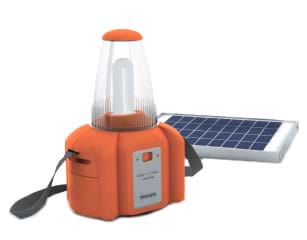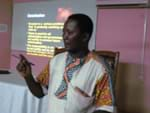For the 57% of the population of Ghana that have access to grid electricity the supply is unreliable and deteriorating. For the many living in rural areas that do not have grid access the chance of connection is remote and, even where it is possible, poorer households are wary of committing to a monthly electricity bill. The search for alternatives has led to a growing interest in solar photovoltaics (PV) as a way of providing reliable electricity, especially to remote rural areas.
Many schemes, however, fail due to poor quality installation and servicing. Deng Ltd is an established engineering company in Accra, selling standalone PV systems for lighting and appliances. It stands out as a company that has succeeded in creating a model for provision of solar energy, especially to rural areas, that is both viable and sustainable. It has done this by venturing out of Accra and setting up a small network of trained dealers that can provide high quality installation and maintenance services to local customers. Deng is the only company in Ghana to establish service providers outside the capital, opening up avenues for entrepreneurs who are willing to stay in their communities. Deng is also hoping to expand this network by recruiting existing businesses in more remote regions that are interested in selling PV systems. Since 1998 Deng and its network of dealers have supplied and installed over 1,000 fixed systems (in homes, schools and health centres) and around 6,000 solar lanterns.
Whilst Deng does sell and install PV-powered grid backup systems around Accra, the passion and focus of Deng's founder, Frede Bosteen, is in providing solar electricity to rural areas that do not have grid access and it is in this area that it is keen to expand. In order to significantly increase the provision of solar energy in Ghana and for Deng's business to expand further into rural areas, potential dealers and technicians must have access to high quality training. Deng has directly addressed this need by setting up a training centre in collaboration with Kwame Nkrumah University of Science and Technology (KNUST) in Ghana and Global Sustainable Energy Services in Australia.
The centre is the first of its kind in Africa south of the Sahara. To date, about 120 men and women have been trained, including health service technicians and university graduates. By proving training to people from other sectors, the centre is contributing the growth of the solar PV market in Ghana. In the words of one trainee: "Before undergoing training I had some theoretical knowledge of solar. However after undertaking the training course I have benefited in understanding the practical application of solar PV which today I apply in my work" Kwasi, Technical Officer at DENG Deng's solar business in Ghana is an example of a scheme driven by both commercial interests and an overwhelming desire to improve the lives of the rural poor. Results suggest they are succeeding. Not only have jobs been created through the expansion of Deng's dealer network but the scheme has also led to the creation of small businesses such as bars with solar fridges and solar powered TV.
Users find that using PV instead of kerosene for lighting gives better light and a cleaner environment, and householders typically save around 20,000 Cedi/month (just over £1) which otherwise would have been spent on kerosene lamps. Customers in areas that do have grid access find that PV provides a more reliable supply and does not come with a monthly electricity bill! As a member of the Holy Trinity Prayer Centre in Nkoranza, says: "We have 500 people coming to the Prayer Centre for retreats. We installed PV for lighting because kerosene was really dangerous. They have brought the mains wires here now but we are not going to connect - we have a reliable supply" Mr Kwasi Affa, a retired driver from Nkoranza, adds: "Now that I have a PV system I don't have to worry about electricity bills" Women and children are also benefiting from having good-quality dependable light at home so they can study or do household chores in the evening. "Personally, solar has brought a great relief for me since as a woman I need light to attend to my domestic chores in the evenings" Madam Asiedu, wife of the Catholic Resident Pastor in Jerusalem, Asekye-Ghana. Both adults and children are also making use of 600 schools that have been equipped with 80 Wp PV systems so that they can remain open in the evening for classes and homework sessions including adult education.
Through using solar PV awareness is also being raised as to the benefits of sustainable energy. As one 17 year-old student, says: "Solar saves time and money. It is also ecologically friendly and makes us know the use of nature." Maternity care has improved due to the use of solar lanterns by traditional birth attendants and hospitals with PV systems now have more reliable lighting, refrigeration for vaccines and insulin and a reliable water supply. Ashden Award money will be used to expand Deng's dealer network to areas least likely to get grid connection. Training materials would also be developed to include solar water pumps, biogas and wind.
Source:




 Excellent
Excellent








